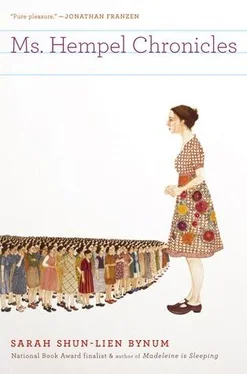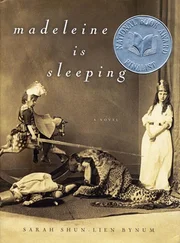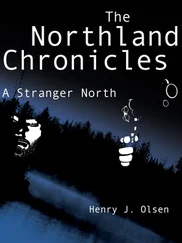Her nightmares took a truly frightening turn when she was ten, and her father began to appear in them, to save her. But she always knew, through the inevitable logic of nightmares, that her father would be destroyed, that he would struggle valiantly but to no avail, and that his knees would crumble and his eyes would dim and he might try to speak a few loving, gurgling words to her before he expired. She knew it with an awful, churning certainty. It didn’t matter what shape the menace took: sometimes it was a sticky pink substance that came bubbling under the door; sometimes it was an infernal drug lord, disguised as her principal, who was trying to bring her school under his narcotic control. These terrors were acute, yet relatively benign, as long as she was battling them by herself. Once her father got involved, the nightmares would escalate: for what was more paralyzing than the sight of your father, corroding in acid, pinned down by a pitchfork, drooling and drug addled? In one dream she sat in the back of his car and watched his eyes in the rearview mirror as he slowly melted into his seat.
Beatrice hurried down the street. She passed a ladder, a trash can, a pool of broken glass.
In her dreams, death always took her father by surprise. Even up until the very end, he’d remain convinced of his immunity. With this same conviction he would, in real life, pick fights with fellow motorists, climb up onto the roof rather than call the handyman, and disappear into the wilderness for whole days at a time. Beatrice found these weekend excursions particularly infuriating. What better way to court calamity than canoeing? She had seen movies; she knew about the dangers. The willful rapids, the bears snuffling about the campsite, the invisible parasites infesting the water. Not to mention the belligerent, banjo-picking locals who would immediately recognize her father for the city-slicking, fancy-pants doctor he was. She would try to tempt him with alluring alternatives: “We could go to the mall,” she’d say, “get some of those soft pretzels that you like.” Or she would volunteer to help him load up the car, and then tell him mournful stories about a girl in her class, whose grades — due to her father’s death in a tragic canoeing accident — had experienced a precipitous decline. But these tactics rarely worked.
Her mother didn’t want him to leave, either. She would not make him sandwiches to eat on the road; she would not smile; sometimes she wouldn’t even appear in the driveway to say good-bye. On the weekends that Beatrice’s father went away, she and her mother would catch glimpses of one another as they each stalked about the house in an undisturbed rage. But when the telephone rang, her mother, answering it, would say gaily, “Oscar? He’s off canoeing!” And somehow, the way she said it — in a bright, emphatic tone that left no room for further questions — made it seem as if Beatrice’s father were right there with them, uttering the words himself. She spoke in the voice he always used when asserting what was most obviously untrue. The effect was strange — hearing this voice come out of her mother. Then, with a slight shrug, she would return to herself, her face slackening, her pen circling the telephone pad, and Beatrice, confronted with the mystery of her father, the mystery of her mother, could only write repeatedly, in ever tinier cursive, Canoeing is a perilous outdoor sport. She wrote it five times on the last page of her science notebook, stopped, remembered herself, and neatly tore out the page; at the end of every two weeks you had to turn in your notebook for a grade.
By Monday morning he would be back again, in time to make Beatrice breakfast and deliver her to school. She softened at the sight of him standing there in the kitchen, flushed and rumpled and stubbled, placing her favorite antique spoon on the table. The wilderness had released him, had given him back. And, just like that, all her fury would be snuffed out. Any irritation was now redirected at her mother, who upon his return had camped out in her bathtub, listening to NPR at a deafening volume. She should come downstairs! Beatrice would silently fume. She should come fluttering in, full of kisses and gratitude and relief!
Disaster had been held off once again. Wasn’t that cause for rejoicing?
For there Amit was, waiting in the checkout line, his small black head shining above the magazine racks. No crotchless panties in sight. Beatrice stood on the sidewalk and watched him pay for the two bottles of ginger ale. What luck, she felt. What extraordinary fortune.
THE EIGHTH GRADERS WERE less fortunate. The next morning dawned drearily, with assurances from the weatherwoman that the sky would remain overcast. The sky was always overcast on Trip Day, the one day out of the whole year when the eighth grade took a very long bus ride to a rather grimy beach. They showed no signs of discouragement, however. Even at the stoplights, the school bus rocked back and forth crazily.
“Rule Number One!” Ms. Hempel hollered, before she let them disembark. “Don’t go in past your waist. There’s only one lifeguard on duty. And don’t forget to wear sunscreen. Those ultraviolet rays will burn you up, even though it’s cloudy!”
“And don’t talk to clowns,” someone shouted from the back.
“Right,” Ms. Hempel said.
The eighth grade clattered off the bus and, without awaiting further orders, stormed the beach. Ms. Hempel and the three other homeroom teachers trudged grimly behind, trying to balance between them the poles for a volleyball net. Yelps could already be heard from the water.
As they cleared the boardwalk, Ms. Hempel saw her students frisking bravely in the surf. It was still very cold out. Some girls wore cheeky little two-pieces flecked with polka dots and daisies; others skulked about in their fathers’ T-shirts. The boys were already immersed up to their necks, their sleek heads bobbing atop the waves. “It’s freezing!” the girls wailed. “Ms. Hempel! It’s freezing!”
Ms. Hempel held their towels in her outstretched arms and rubbed their backs when they scrambled, dripping, up from the water. The girls clustered about her, reaching out their trembling hands and pressing them against her cheek: “See?” they asked. “See how cold I am!”
“Brrrrrr!” Ms. Hempel said, and rubbed them harder.
The girls then arranged their towels into a beautiful mosaic on the sand. Dropping down upon their knees, they dug into their beach bags, emerging with plastic containers and painted tins and shoeboxes lined with waxed paper. These they gravely placed in the middle of the mosaic. Julianne circled about them, distributing paper plates, while Keisha handed out Dixie cups half filled with soda. One by one the lids were removed, revealing jerked chicken, fruit salad, crumbling banana bread, couscous, fried plantains, sesame noodles, sticky little rice balls. The girls fell upon the food. “We organized a pot-luck,” Sasha explained, forking a pineapple wedge and making room for Ms. Hempel. “Please help yourself.”
Meanwhile, the boys had straggled up onto the beach and were now huddled around the school cooler, peering down into sodden paper bags. They consoled themselves by clapping their sacks of school-issued potato chips and making them explode.
“They thought a potluck was stupid,” Alice said, with profound satisfaction.
A family of seagulls and the three other homeroom teachers patrolled the area. Ms. Hempel shouted out, “Everything’s okay over here!” and accepted a lemon square, reminding herself that her presence was required. She would make sure that no paper plates were left in the sand. She would apply sunscreen to the girls’ shoulders, and provide an adult perspective on their discussions. Drowsily, she gazed out at the ocean. “I can’t believe you went in,” she murmured.
Читать дальше












